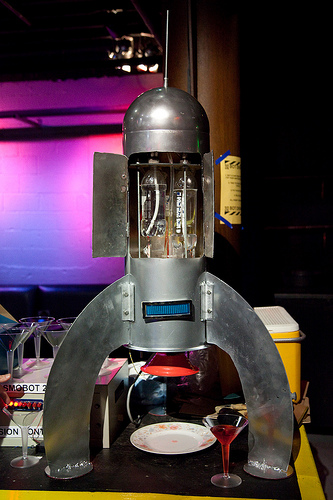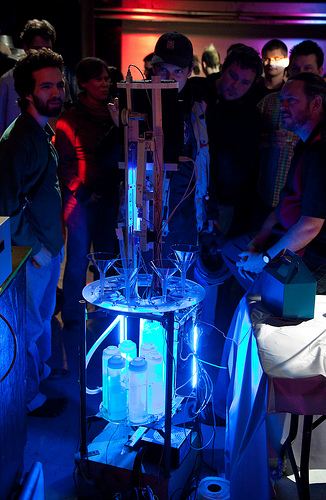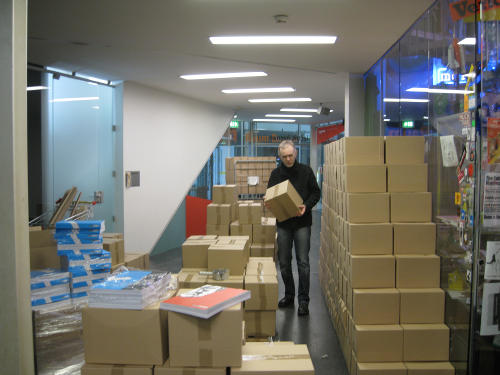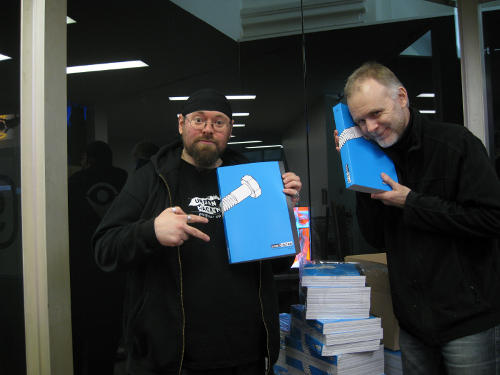
Roboexotica in der New York Times: "Just Like Mombot Used to Make"
"A simple rule of robotic personality seems to be: don’t make things the most efficient way," said Magnus Wurzer, who has been running the Vienna-based Roboexotica, a festival where scientists have gone to build, showcase and discuss "cocktail robots" since 1999.Link
One entry, Beerbot, detects approaching people and asks for beer money. When it acquires enough, it "buys" itself a beer. Bystanders can watch it flow into a transparent bladder. As for other humanizing behaviors, "like a robot that doesn’t stop short at lighting a cigarette but actually goes ahead and smokes it?" Mr. Wurzer says, "We had that.
Roboexotica has inspired a stateside version as well, which just had its third annual celebration in San Francisco.
And in at least one case in Europe, a robot actually got behind a bar. From 1999 to 2002, a scarlet-eyed metal robot named Cynthia poured drinks at Cynthia's Bridge Bar and Lounge in London. But according to Mr. Wurzer, "she was too costly to maintain once the bar was sold by the robot's maker."
monochrom @ Pomona College
Vortrag am Pomona College (Pomona, Kalifornien) um 10:30 am 25. Februar 2010.
Wir versprechen Größe!
Wir versprechen Größe!
monochrom @ Crashspace LA: Of drunken machines and horny relays
Sex-Maschinen! Cocktail-Roboter! Und mehr! Johannes wird einen Workshop/Vortrag über die Erstellung hedonistischer Maschinen halten. Nicht verpassen!

Im Crashspace LA, 24. Februar 2010; 20 Uhr.

Im Crashspace LA, 24. Februar 2010; 20 Uhr.
Fotos: BarBot 2010 in San Francisco
Hier sind ein paar Fotos, die Scott Beale gestern auf der BarBot 2010 gemacht hat. Bar Bot ist ein Roboexotica-Spin-Off-Festival in San Francisco.


Link


Link
Bar Bot 2010 (inspiriert durch die Roboexotica) in San Francisco
Die Roboexotica kriegt Nachwuchs! Und unser Johannes hilft als alkoholschwangerer Geburtshelfer! Ja, es ist Zeit für "Bar Bot 2010" in San Francisco.


In a world where robots and humans struggle together in the fight against boredom...Daten?
Only one event ends up with the robots dancing "The Human" while the meat puppets (you) end up singing the praises of RoboBartenders.
This February, come hang out with some alternate life-forms at BarBot 2010.
Wed/Thur Feb 17-18, 2010 - 9pm-2amLink
21+ with photo ID $10 advance / $15 at door
DNA Lounge - 375 Eleventh St., San Francisco
Naschaudirdasan! Vorbestellungen für monochrom #26-34: Ye Olde Self-Referentiality
Kaum zu glauben, aber monochrom #26-34 kommt im März 2010 raus!
500 Seiten, 55 Unzen, für 18 Euros oder 24 US-Dollar.
Release-Tour:
11. März 2010 @ MUSA in Wien (After-Party im Metalab)
3. April 2010 @ Videotage in Hong Kong
27. April 2010 @ The Nuyorican Poets Cafe in New York City
(Termine für LA, SFO, London, München, Berlin werden demnächst bekannt gegeben)

Content?
Link
500 Seiten, 55 Unzen, für 18 Euros oder 24 US-Dollar.
Release-Tour:
11. März 2010 @ MUSA in Wien (After-Party im Metalab)
3. April 2010 @ Videotage in Hong Kong
27. April 2010 @ The Nuyorican Poets Cafe in New York City
(Termine für LA, SFO, London, München, Berlin werden demnächst bekannt gegeben)

Content?
Screws and astronauts. Roundworms and Columbia. Cannibalism at sea. Conlanging 101. The basic mechanisms of New Economy and Neoliberalism. The sketchy world of Elffriede. The status of martial law. RFID. Henry the Halibut. Rieseberg and the emergence of work. Dracula (a poem). Historicity, temporality, and politics in the cinema aesthetics of Deleuze, Rancière and Kracauer. Or-Om's call to the children. The problem with social robots. An (anti)history of Rave. The life of a Swiss banker and fascist anti-imperialist. Considerations by Martin Auer. The Stepford wives and stereotypes of putative perfection. Noise and talk. A little potpourri about amok runners, mass homicide and 80s pop songs. Scratching means life. Mae Saslaw's 10005. Kiki and Bubu and Orwell's 1984. Cybernetics and whatever happened to it. The integrating of the Fringe. Witchcraft and lesbianism. The weirdness (and PR) of the wonders of Oz. Rachel Lovinger's personal journey towards datameaningfulness. Revolution, ads and revolt. A pilot study on the philosophy of life of schizophrenics. Pro Asylum. Bird Ball. Medicine in the Dark Ages (humor, leeches, charms and prayers). Reflections about Ivan Grubanov and Paul Chan. Communism, anti-German criticism and Israel. Surprise findings. Hot, hard cocks and tight, tight unlubricated assholes. Dubbing (Casablanca and forged movies). The treatment of media in H. P. Lovecraft's cosmic horror. The relationship of books and films explained via Capricorn One. Stories about our friends (e.g. whales). The history of Pinball machines. Italy and the incubation of fascism. Consider Phlebas and The Waste Land. The implicit ideology of media activism and its current opportunities. Urban Pilgrims touring Vienna. Ronald McDonald slapping a guy in the face. Text adventures. The Shining (Jack of all Trades, Master of None). Reappropriating architecture and playing with the built city. Recoding LOLcats. Sitcom as Endgame, Tatort out of the Volksempfänger (an attempt to understand the culture industry). Gender, race and film comedy. Neon Bible and its hidden agenda. The SNAFU principle and how hierarchies inhibit communication. The power of disposition over (global) space as a new dimension of class structuration. Lustgas. Stammlager 217 and Israel's popular culture of the 1960s. Supertheory(TM). Adopt a highway. X-Wing penetration, dominatrix fathers and phallic light sabers. Europanto. The Unicorn and the Maiden. Leben macht Spass. How to build a magnificent Boom-Boom. Lots of reviews of deities, personalities, questions, states of mind, culture (as opposed to nature), nature (which cannot be divided from culture), words, social practise, future(s), technological artefacts, experiences, things on a keyboard, and matter. The short story of Pocahontas and Avatar. Walled World. Hacking the Spaces. Sally Grizzell Larson's No. 29. The tyranny of structurelessness. Jack Kirby's top 20 creations. The need of Change (keep your coins). Fehler and Fairchild Semiconductor. Richka's Answering Space and the question about Home. Worm. Future 42.0. Doctorow's row-boat. Bare life innovation. A mnemonic of longing. Etiology of Romero-Fulci Disease (and the case for prions). Campaign for the abolition of personal pronouns. Yahooking. A social-centric, canine-inspired perspective on the placebo effect. Helpless machines and true loving caregivers. Information doesn't work (that's why we need information workers). The myth of Xanadu (reconsidered). John Wilcock and the Manhattan Memories. The Cult of Done. Looking at Gene Wilder. Sweet Home Alabama (and why diamonds are a girls worst nightmare). Pretesting the idea of apparative hermeneutics. Ignorantism. Artistic fears in the age of religious fundamentalism. Smoking against America. The Things of Eternity. After warfare in Yugoslavia (or: moral order of recognition). Existential game-show experiments. The epic of Gilgamesh. Mozart as public relations hype. Las Vegas and its casino traditions. Sikhs. Pornographic coding. Invader and public tiles. Splasher, street art and the Situationist International. MakerBot. Long live the porn flesh. The three rules of sidewalk junk giveaways. Melcus and his maps. Mister plomlompom's embracing of post-privacy. Catty (the baseball player). John Duncan (in: Blind Date). Michayluk's crush of worship of the copy. The Telecommunications History Group. monochrom's initiative for the accomplishment of Total Population. The medieval agricultural year. Office Art. A cartoon that makes neoliberals laugh. A rough guide to number stations. The digital age and ubermorgen.com. Mobile phones and "for whom the SAR tolls". A call for more science... and giant dinosaurs who bite each others head off.Vorbestellungen? Klaro... am besten per Mail an mono AT monochrom.at
Link
"Hacking the Spaces" in Arranca ("Diverser leben, arbeiten und Widerstand leisten")
Aus queer-feministischer Perspektive gehen wir auf die Spurensuche nach ökonomischen Prozessen der Transformation, die wir in bestehenden Praxen erkennen können. Es existieren Projekte, bei denen Menschen Ressourcen wie Geld, Zeit und Produktionsmittel kollektiv nutzen, um gemeinsam oder individuell an Sachen zu arbeiten, die ihnen Spaß machen und mit denen sie ein gesellschaftliches Ziel verbinden. Ein Beispiel dafür sind Hackerspaces. In diesen Räumen treffen sich Menschen, die sich für Technologie, Computer, Programmieren, Basteln, Kunst und Wissenschaft interessieren, um zusammen abzuhängen und zu arbeiten. Es gibt dort nicht nur Rechner, sondern auch Labore, Maschinen, Werkzeug, Bastelmaterial und vor allem Wissen, das geteilt werden kann. Ihrem Selbstverständnis nach sind Hackerspaces nicht dazu da, Startups zu gründen, um die gemeinsamen Arbeitsergebnisse als Waren kapitalistisch zu verwerten. Vielmehr geht es darum, Produkte (weiter) zu entwickeln und zugänglich zu machen. Dass es dabei auch zu kritischen Auseinandersetzungen um Machtpositionen kommt, zeigt der Text Hacking The Spaces. Johannes Grenzfurthner und Frank Apunkt Schneider problematisieren darin, dass Hackerspaces überwiegend von weißen, männlichen Nerds gestaltet werden und fordern, sich mit der Frage auseinanderzusetzen, wie sich dies auf die Praxis der Hackerspaces auswirkt. Hackerspaces stehen in einer linken, gegenkulturellen Tradition, sich Freiräume zu schaffen. Und sie überschreiten Grenzen: Nicht nur zwischen Wohnzimmer und Arbeitsplatz wird die vermeintliche Trennung aufgehoben, sondern auch die Gegenüberstellung von Arbeit mit Kunstmachen und Spaßhaben wird durchquert. Sie können Räume sein, die Arbeitsweisen und Technologien entwickeln, die zur Veränderung der Gesellschaft beitragen und Systeme im besten Sinne von benutzeruntypischem Verhalten hacken.Link
monochrom besteht aus johannes grenzfurthner, evelyn fuerlinger, franky ablinger, harald homolka list, frank apunkt schneider, daniel fabry, günther friesinger, anika kronberger, roland gratzer sowie gott und der welt. immerhin!
projekte / dokumentation
termine / chronologie
mono print / jahrbuch
mailing list
blog (english)
gemischtwaren
wikipedia
amazon
youtube
itunes


